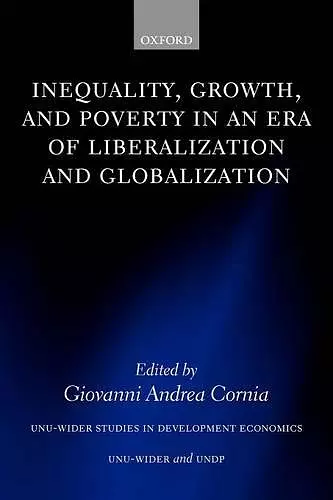Inequality, Growth, and Poverty in an Era of Liberalization and Globalization
Format:Paperback
Publisher:Oxford University Press
Published:16th Jun '05
Currently unavailable, and unfortunately no date known when it will be back
This paperback is available in another edition too:
- Hardback£74.00(9780199271412)

Within-country income inequality has risen since the early 1980s in most of the OECD, all transitional, and many developing countries. More recently, inequality has risen also in India and nations affected by the Asian crisis. Altogether, over the last twenty years, inequality worsened in 70 per cent of the 73 countries analysed in this volume, with the Gini index rising by over five points in half of them. In several cases, the Gini index follows a U-shaped pattern, with the turn-around point located between the late 1970s and early 1990s. Where the shift towards liberalization and globalization was concluded, the right arm of the U stabilized at the 'steady state level of inequality' typical of the new policy regime, as observed in the UK after 1990. Mainstream theory focusing on rises in wage differentials by skill caused by either North-South trade, migration, or technological change poorly explains the recent rise in income inequality. Likewise, while the traditional causes of income polarization-high land concentration, unequal access to education, the urban bias, the 'curse of natural resources'-still account for much of cross-country variation in income inequality, they cannot explain its recent rise. This volume suggests that the recent rise in income inequality was caused to a considerable extent by a policy-driven worsening in factorial income distribution, wage spread and spatial inequality. In this regard, the volume discusses the distributive impact of reforms in trade and financial liberalization, taxation, public expenditure, safety nets, and labour markets. The volume thus represents one of the first attempts to analyse systematically the relation between policy changes inspired by liberalization and globalization and income inequality. It suggests that capital account liberalization appears to have had-on average-the strongest disequalizing effect, followed by domestic financial liberalization, labour market deregulation, and tax reform. Trade liberalization had unclear effects, while public expenditure reform often had positive effects.
'..essential reading for anyone concerned with poverty reduction and the impact of current policy reforms' * Frances Stewart, Director, Queen Elizabeth House, University of Oxford *
'...a valuable contribution to the important but still very limited body of serious analysis on the enormously important question of how liberalization and globalization affect people though their growth, distribution and poverty impacts. The volume addresses most of the key issues and, through the material it adds to the ongoing debates, will help to shift the balance of considered opinion away from the overoptimistic predictions of some of the cheer-leaders for liberalization and globalization to a more plausible middle ground. Such a shift is essential if these phenomena are to be appropriately controlled and harnessed for human betterment.' * Albert Berry, Professor, Department of Economics, University of Toronto *
"This book is a well-researched, energetic and analytically adept multi-authored volume..." * Development and Change *
"Together they make a valuable collection of papers on linkages between inequality and/or trade with growth and/or povertyresearchers will find much of value in the volumes, and research students will find the reviews, methods and case studies informative and useful." * Journal of International Development *
ISBN: 9780199284108
Dimensions: 234mm x 158mm x 26mm
Weight: 716g
464 pages